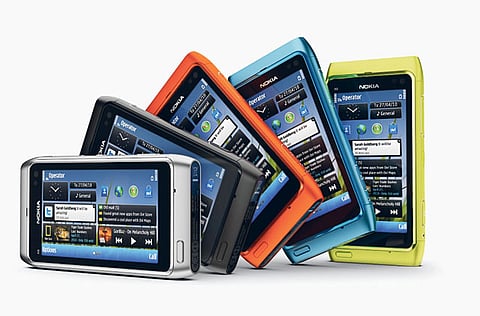Nokia needs more than N8 to increase market share
Feels meego is way to go for more high-end handset sales

Dubai: Nokia's recently unveiled N8 smartphone is expected to perform well, but not well enough to compete against Apple's iPhone or Research in Motion's BlackBerry, industry analysts say.
The N8 is the latest in the N series and a "big improvement" on the N97 and 5800, according to Carolina Milanesi, research vice-president of mobile devices with Gartner.
"However, there is still work to be done," she adds. "The N8 will help Nokia stabilise and potentially grow its market share, but it will not giving Nokia a strong foothold in the high-end market."
The N8 will appeal more to existing Nokia users rather than users of other networks, says Milanesi.
Tim Shepherd, a mobile industry analyst at technology research firm Canalys, says the N8, along with the three other Symbian smart phones announced at Nokia World in London last week, will update to Nokia's touch screen Symbian smart phone portfolio, which is long over due.
"I have little doubt that the Nokia N8 will perform well. It's aggressively priced and offers a good multimedia experience. The camera is excellent and it ships with free turn-by-turn navigation," he said.
Genuinely innovative
However, the N8 cannot compete with players at the top of the smartphone market like Apple's iPhone or high-end Android devices and does little to address the gap at the top of Nokia's portfolio, said Shepherd. For that, users will have to wait for the MeeGo handsets. Nokia has teamed up with Intel to develop MeeGo, a new open source, Linux-based operating system for mobile computing.
"It badly needs to launch a compelling flagship MeeGo device soon that can compete in that space to reassert itself as a differentiated and genuinely innovative force in the market," he said.
Shepherd said there has been no recent update from Nokia on the launch of a MeeGo device. He anticipates that a commercially available device will not be available until early 2011.
Nokia's current operating system, Symbian, is the most used in the world, but has been criticised for being slow and out of date. It will need a re-vamp to measure up against the strong competition from Google's Android platform, Apple's iOS, and possibly Microsoft's Windows Phone 7, due to appear on new smart phones in the coming months.
"Symbian 3 is an evolutionary step that has updated the user experience enough to compete for now, but still does not feel as fresh and exciting as it needs to," said Shepherd. "A more substantial platform overhaul in Symbian 4, due to appear on Nokia devices next year, will need to deliver far greater improvements and enhancements if Nokia's Symbian smart phones are to remain competitive."
Nokia still controls a considerable share of the market. In the second quarter of 2010, Nokia held 38 per cent of the global smartphone market, 36 per cent of the wider global mobile phone market and leads both by a "considerable margin", said Shepherd. What's more, Nokia saw a 60 per cent growth in smartphone shipment value in the second quarter year on year, leads the mobile phone market in Europe, the Middle East, Africa, Asia Pacific and Latin America and is a "significant force that should not be underestimated", he added.
But Nokia has lost out to Apple and RIM in the high-end market in recent years. "Undoubtedly it has lost momentum in recent quarters and needs a high-profile product to give it a chance to compete at the high-end of the market," he said.
Steady drop
Symbian has seen a steady drop in market share in the first quarter of 2007 to the same period this year, compared to RIM and IOS, according to Gartner research.
"One of [Nokia'a] key weaknesses is its lack of progress in North America where it only held a 4 per cent share of the smart phone market in the second quarter of 2010. This, combined with its lack of products to compete at the high-profile, high-end of the smart phone market where the media focus their attention, are the two biggest problems facing Nokia at present," said Shepherd.
Nokia will be hoping that its new CEO, Canada-born Stephen Elop, will bring a greater understanding of the dynamics of the North American market and help them to finally see some progress there, noted Shepherd.
The N8 was given a pre-launch party in Dubai, although the device will not arrive in stores in the UAE until the end of September or early October, according to Chris Braam, Nokia Vice-President for the Middle East and Africa. "We are absolutely a company in transition and with transition you need to make certain adaptations and changes in organisation and offering and that's exactly the phase we're in at the moment," said Braam. "We know that with the changes we've been announcing recently and with this offering that we will be successful in the years to come."



